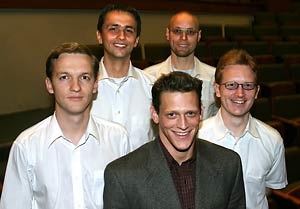UC Berkeley Press Release
Solid fuel cell technology takes first at UC Berkeley Business Plan Competition
BERKELEY – An economically viable fuel cell technology that will save long-haul freight truckers thousands of dollars in diesel fuel every year has won the $25,000 grand prize at the sixth annual University of California, Berkeley, Business Plan Competition at the Haas School of Business.
The competition is organized by a team of Berkeley MBA students and hosted by the Haas School's Lester Center for Entrepreneurship and Innovation in collaboration with UC Berkeley's College of Engineering, the School of Information Management and Systems and UC San Francisco.
UC Berkeley MBA students founded it in 1998 to create a platform to help transform university innovations into viable commercial enterprises. Each venture must have at least one student, alumnus/a, or faculty member from UC Berkeley or UC San Francisco's Life Sciences campus on its management team.
 The Proton Power team (clockwise from left): Berkeley MBA students Cornelijus Chelutka, Marek Fibrich, Andrei Marinescu and Jeff Renaud, and CalTech researcher Dane Boysen. |
This year's first place winner, Proton Power, has developed a solid acid fuel cell technology that will initially serve as auxiliary power units for long-haul freight trucks. These units will save truckers from having to idle their diesel engines to power heat, air and electricity in their truck cabins and will save the average trucker an estimated $2,600 annually in fuel costs. California truckers last week staged several protests of high diesel fuel prices.
The auxiliary units are rechargeable at methanol refueling stations about every 40 days and also significantly reduce noise and pollution.
This technology was developed over the past seven years by two researchers from the California Institute of Technology and then transformed into a commercially viable business idea with the help of four UC Berkeley MBA students.
Analog Micro Displays (AMD) won the second prize of $10,000. The venture uses a Micro-Electro-Mechanical System, or MEMS-based projection system, to offer UXGA or HDTV resolution color imaging that consumes little power, is small and light, and costs a fraction of conventional projectors.
AMD's first product can project a 4-foot-by-4-foot image and is aimed at the mini projector market. Its team consists of a UC Berkeley MBA student, a Ph.D. student in electrical engineering, and a Lawrence Berkeley Laboratory scientist.
DFM won both the third prize and the People's Choice Award, which is decided by the audience at the awards ceremony. Each prize is worth $5,000. DFM's patent-pending "Pattern Matcher" software seeks out flaws and optimizes the design of semiconductor chips before they are manufactured.
According to the team, comprised of three UC Berkeley Ph.D. students in engineering and one MBA student, the software will not only create huge cost savings, but also will significantly reduce the time required to get chips to market. One current DFM customer estimates it will shave three months off every design cycle.
The first-ever Best of UC Berkeley and UC San Francisco Technology Prize of $7,500 was awarded to Silicon Clocks for developing a MEMS-based timing component for cell phones and microprocessors so tiny that it can fit anywhere on a chip. By reducing its cost and size and improving performance compared to conventional quartz-based timing components, this technology increases battery life and allows for added functions.
This year's competition enjoyed the support of more than 40 judges from leading venture-capital firms and donations from 14 sponsors.
The sponsors include:
- Gold Sponsor: Sevin Rosen Funds (which is also sponsoring the Technology Prize)
- Silver Sponsors: Allegis Capital and Intel Capital
- Bronze Sponsors: Foundation Capital, Hummer Winblad Venture Partners, New Path Ventures, Pillsbury Winthrop, Qualcomm, Reed Smith, Ritchey Fisher Whitman & Klein, Sirenza Microdevices, Versant Ventures
- In Kind Sponsor: PaloAlto Software
- Other Contributors: Kevin Warnock of Silveroffice and Silicon Valley Bank

